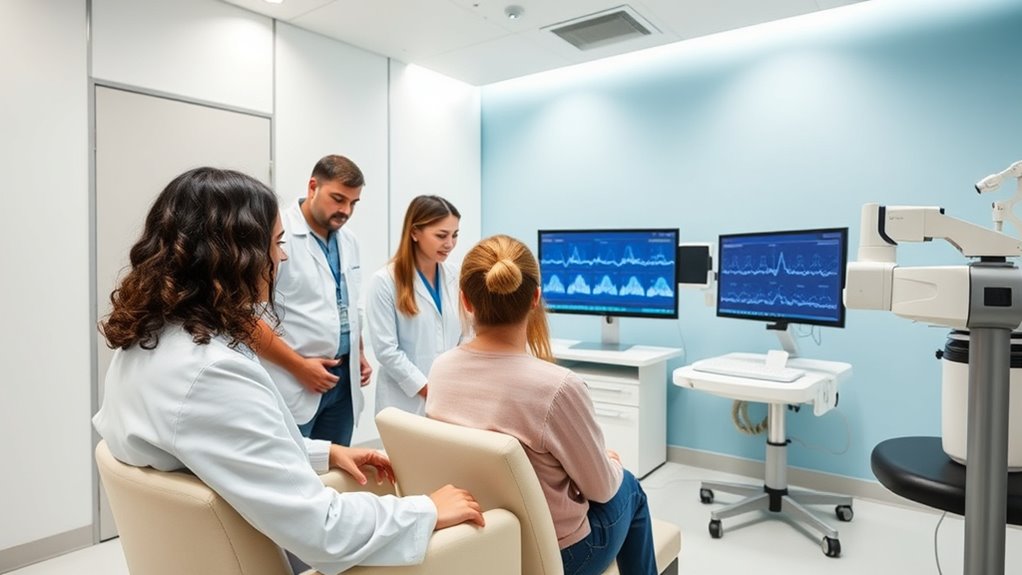Multidisciplinary clinics gather specialists like audiologists, ENT doctors, neurologists, and speech therapists to work together on complex hearing cases. This team approach streamlines your diagnosis and treatment by sharing insights, interpreting tests collectively, and avoiding redundant procedures. It makes your healthcare experience more efficient and personalized, reducing delays and confusion. If you want to see how this collaborative process can improve your hearing health, keep exploring the benefits these clinics offer.
Key Takeaways
- Multidisciplinary clinics bring together specialists to collaboratively evaluate complex hearing conditions, enhancing diagnostic accuracy and treatment planning.
- They streamline patient care by providing comprehensive testing and consultations in a single, coordinated setting.
- Team-based approaches reduce redundancies, delays, and misdiagnoses in hearing health management.
- Interdisciplinary collaboration allows for personalized, integrated treatment options based on collective insights.
- These clinics promote patient-centered care, improving understanding, engagement, and overall experience in managing complex hearing issues.

Have you ever wondered how complex health conditions are managed more effectively? Multidisciplinary clinics are transforming healthcare by bringing together specialists from various fields to provide all-encompassing, coordinated care. In these clinics, interdisciplinary collaboration is at the heart of the process, guaranteeing that every aspect of a patient’s condition is addressed seamlessly. This approach allows different healthcare professionals—such as audiologists, otolaryngologists, neurologists, and speech therapists—to share insights, review tests, and develop unified treatment plans. By working closely together, they eliminate redundancies, reduce delays, and enhance diagnostic accuracy, especially for complex hearing issues that require multiple expertise areas.
Multidisciplinary clinics unite specialists to provide seamless, comprehensive care for complex health conditions.
In a multidisciplinary clinic, patient-centered care becomes more than just a buzzword; it turns into a tangible experience. You, as a patient, benefit from a streamlined process where your concerns are heard and understood from different perspectives. Instead of bouncing between specialists or waiting weeks for separate appointments, you receive a coordinated evaluation in a single setting. This integrated approach simplifies your journey, helping you understand your condition better and making it easier to navigate treatment options. It also fosters open communication, allowing your healthcare team to align their goals with your personal needs and preferences.
These clinics foster a collaborative environment where each specialist contributes their unique expertise, making complex diagnoses more precise. For example, an audiologist might identify specific hearing impairments, while an otolaryngologist assesses structural issues, and a neurologist evaluates neurological factors. Together, they interpret test results and clinical findings to arrive at a comprehensive diagnosis. This teamwork reduces the chances of misdiagnosis or overlooked symptoms, providing you with a clearer understanding of your condition. The collective input of multiple specialists ensures that you receive a tailored treatment plan, which might include hearing aids, medical therapy, or surgical options, depending on what’s best for your specific situation.
Furthermore, understanding the importance of comprehensive testing, such as diagnostic accuracy, helps ensure that all aspects of your hearing health are thoroughly evaluated. Ultimately, multidisciplinary clinics exemplify the shift toward a more integrated, patient-focused healthcare system. By emphasizing interdisciplinary collaboration and patient-centered care, they not only improve diagnostic accuracy but also enhance your overall experience. You’re no longer just a case to be managed; you become an active participant in your health journey. With a team working cohesively around you, complex hearing diagnoses are handled more efficiently, leading to better outcomes and a more positive path forward.
Frequently Asked Questions
What Are the Costs Associated With Multidisciplinary Hearing Clinics?
When considering the costs associated with multidisciplinary hearing clinics, you should conduct a thorough cost analysis to understand expenses involved. These clinics often involve multiple specialists, which can increase costs but might reduce overall treatment time. Insurance coverage varies, so check if your plan covers multidisciplinary services. Although upfront costs can be higher, streamlined diagnoses and coordinated care can ultimately save you money and improve outcomes.
How Long Does a Typical Multidisciplinary Hearing Assessment Take?
A typical hearing assessment usually lasts about 1 to 2 hours, depending on the complexity of your case. During this time, you undergo various tests to evaluate your hearing ability. Appointment scheduling can often be flexible, but it’s best to plan ahead to guarantee enough time for a thorough hearing test. This allows you to receive detailed results without feeling rushed, making the process more effective.
Are Multidisciplinary Clinics Available in Rural or Underserved Areas?
You might think finding multidisciplinary clinics in rural areas is impossible, but it’s more common than you imagine! Many clinics now leverage telehealth services and community outreach programs to offer thorough hearing assessments remotely. These initiatives bridge the gap, ensuring you get expert care without traveling miles. So, even in underserved regions, you can access specialized hearing evaluations, making quality healthcare truly reachable wherever you are.
What Technologies Are Used in Complex Hearing Diagnostics?
In complex hearing diagnostics, you rely on advanced imaging techniques like MRI and CT scans to visualize ear structures and identify abnormalities. Genetic testing also plays a vital role by uncovering hereditary factors contributing to hearing loss. These technologies enable you to make accurate diagnoses, tailor treatments, and improve patient outcomes. Combining imaging and genetic insights ensures a thorough understanding of hearing issues, especially in intricate or unresolved cases.
How Do Multidisciplinary Teams Coordinate Patient Care?
In coordinating patient care, you’ll see that team collaboration is essential. The team communicates regularly, sharing patient information and insights to develop thorough treatment plans. Effective patient communication ensures the patient understands their diagnosis and options, fostering trust and adherence. You’re part of a coordinated effort, where each specialist contributes their expertise, working together seamlessly to streamline diagnoses and improve patient outcomes.
Conclusion
By visiting a multidisciplinary clinic, you simplify your complex hearing journey, experience coordinated care, and benefit from expert teamwork. You gain clarity through extensive assessments, find solutions with personalized treatment plans, and enjoy seamless support every step of the way. These clinics turn confusion into confidence, delays into progress, and uncertainty into understanding. Embrace the collaborative approach, trust the combined expertise, and take control of your hearing health with confidence and ease.










